|
|
|
Sort Order |
|
|
|
Items / Page
|
|
|
|
|
|
|
| Srl | Item |
| 1 |
ID:
123655
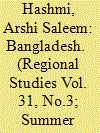

|
|
|
| 2 |
ID:
106174
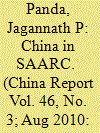

|
|
|
| 3 |
ID:
066283
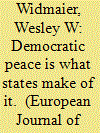

|
|
|
| 4 |
ID:
120183
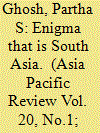

|
|
|
|
|
| Publication |
2013.
|
| Summary/Abstract |
The South Asian Association for Regional Cooperation (SAARC) is now 28 years old, yet its success is nominal. That more important bilateral issues are discussed on the sidelines of SAARC Summits proves the point. Intra-regional trade is still miniscule compared to the region's overall share in the world trade. The biggest defaulter is India, the most prominent member of the group. The purpose of this paper is first to raise the question whether South Asia qualifies to be called a region, and second to argue that, given the problems it faces with most of its neighbours, India is forced to conclude that SAARC matters the least for it. For economic and strategic reasons, India's interests lie in global networking and in a balanced relationship with China. Since Chinese military, diplomatic, and economic presence in South Asia poaches into India's perceived sphere of influence, India's interest in SAARC is limited to that context for otherwise it neither provides large markets for India nor does it contribute to India's strategic policy. Inversely, such a situation justifies India's neighbours playing the China card to bargain with India though that card its losing its value. To buttress our arguments we have drawn from the region's historical experiences as well as from recent developments in international and South Asian politics, including domestic politics.
|
|
|
|
|
|
|
|
|
|
|
|
|
|
|
|
| 5 |
ID:
118193
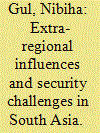

|
|
|
| 6 |
ID:
118917
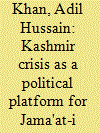

|
|
|
|
|
| Publication |
2012.
|
| Summary/Abstract |
This paper looks at Jama'at-i Ahmadiyya's political involvement in the Kashmir crisis of the 1930s under its second and most influential khalifat al-masih, Mirza Bashir al-Din Mahmud Ahmad, who took over the movement in 1914, six years after the death of his father, Mirza Ghulam Ahmad. Communal tensions springing from the Kashmir riots of 1931 provided Mirza Mahmud Ahmad with an opportunity to display the ability of his Jama'at to manage an international crisis and to lead the Muslim mainstream towards independence from Britain. Mahmud Ahmad's relations with influential Muslim community leaders, such as Iqbal, Fazl-i Husain, Zafrulla Khan, and Sheikh Abdullah (Sher-i Kashmir), enabled him to further both his religious and political objectives in the subcontinent. This paper examines Jama'at-i Ahmadiyya's role in establishing a major political lobby, the All-India Kashmir Committee. It also shows how the political involvement of Jama'at-i Ahmadiyya in Kashmir during the 1930s left Ahmadis susceptible to criticism from opposition groups, like the Majlis-i Ahrar, amongst others, in later years. Ultimately, this paper will demonstrate how Mahmud Ahmad's skilful use of religion, publicity, and political activism during the Kashmir crisis instantly legitimized a political platform for Jama'at-i Ahmadiyya's entrance into the mainstream political framework of modern South Asia, which thereby has facilitated the development of the Ahmadi controversy since India's partition.
|
|
|
|
|
|
|
|
|
|
|
|
|
|
|
|
| 7 |
ID:
135609
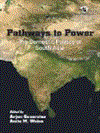

|
|
|
|
|
| Publication |
New Delhi, Orient Blackswan Private Limited, 2014.
|
| Description |
viii, 420p.Hbk
|
| Standard Number |
9788125054573
|
|
|
|
|
|
|
|
|
|
|
|
Copies: C:1/I:0,R:0,Q:0
Circulation
| Accession# | Call# | Current Location | Status | Policy | Location |
| 058050 | 320.954/GUN 058050 | Main | On Shelf | General | |
|
|
|
|
| 8 |
ID:
096041


|
|
|
|
|
| Publication |
2010.
|
| Summary/Abstract |
A plethora of theoretical perspectives have explained India and Pakistan's nuclearization. Such arguments, while partially correct, offer little that incorporates how the constitutive nature of states' identities explain their perceptions of (in)securities and nuclear policy choices. In this article, I offer an interpretive analysis of India and Pakistan's nuclear trajectory by exploring the representations of (and the connections between) their nationalist identities, perceptions of insecurities and nuclear policy choices. Following the critical constructivist premise, I argue that while India and Pakistan have justified their nuclear policies on the basis of certain geo-strategic (in)securities, the interpretation of what constitutes their national selves and (in) securities have been driven by their historical legacies, economic or developmental anxieties, and their political leaders' (or states') ideologies. Seen from this critical constructivist perspective, I particularly draw attention to a conjectural moment of South Asian politics, where, following India's nuclear detonation under the BJP in May 1998, the nuclear (in)security discourses of India and Pakistan have drawn from cultural re-articulations of their nationalist identities and (in)securities to justify their nuclear policies. I conclude by suggesting the need to engage realism (i.e. the material realm) with critical constructivism (i.e. the interpretive realm) to comprehend cultural productions of identities and (in)securities in inter-state politics.
|
|
|
|
|
|
|
|
|
|
|
|
|
|
|
|
|
|
|
|
|